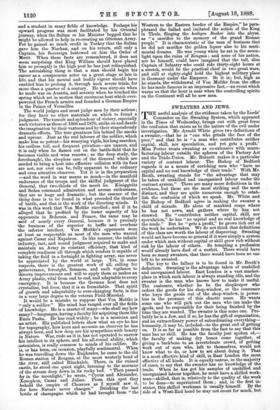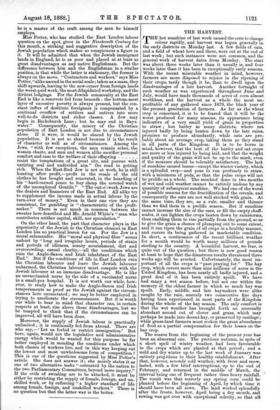SWEATERS AND JEWS.
THE useful analysis of the evidence taken by the Lords' Commitee on the Sweating System, which appeared in the Times of Wednesday, brings out with great force the confusion that exists as to the nature of the evil under investigation. Mr. Arnold White gives two definitions of a sweater,—that he is "one who grinds the face of the poor," and that he is "a man who contributes neither capital, skill, nor speculation, and yet gets a profit.' Miss Potter treats sweating as co-extensive with manu- facturing labour outside the spheres of the Factory Act and the Trade-Union. Mr. Burnett makes it a particular variety of contract labour. The Bishop of Bedford regards it as a means of enriching men who "have no capital and no real knowledge of their trade." With Mr. Booth, sweating stands for "the advantage that may be taken of unskilled and unorganised labour under the contract system." There are many more definitions in the evidence, but these are the most striking and the most distinct, and they are quite numerous enough to estab- lish the confusion of which we speak. Mr. White and the Bishop of Bedford agree in making the sweater a child of miracle. He alone of mankind reaps where he has not sown, and gathers where he has not strawed. He "contributes neither capital, skill, nor speculation," he has "no capital and no real knowledge of the trade." But he "gets a profit," he grows rich out of the work he undertakes. We do not think that definitions of this class are worth the labour of disproving. Sweating would not have become so general if it were simply a system under which men without capital or skill grow rich without risk by the labour of others. So tempting a profession would already have died of a surfeit. There would have been so many sweaters, that there would have been no one left to be sweated.
The key to the fallacy is to be found in Mr. Booth's definition. Sweating is the advantage taken of unskilled and unorganised labour. East London is a vast market- place in which such labour is always standing idle, and the sweater is the man who knows how to make it useful. The customer, whether he be the shopkeeper who orders the goods for his shop-window, or the consumer who buys the goods out of the shop-window, is power- less in the presence of this chaotic mass. He wants some one who will pick out the men who can make the gpods, and be responsible for their being finished by the time they are wanted. The sweater is this some one. Pro- bably he is a Jew, and if so, he has the gift of organisation, and an extraordinary power of subordinating everything— humanity, it may be, included—to the great end of getting on. It is as far as possible from the fact to say that this man has no skill. He has the faculty just spoken of,— the faculty of making dry bones come together, of giving a backbone to an invertebrate crowd, of getting work out of men who, left to themselves, would not know what to do, or how to set about doing it. That is a most effective kind of skill, in East London the most effective of all kinds. It is equally untrue, in the majority of cases, to say that the sweater has no knowledge of the trade. When he has got• his samples of unskilled and unorganised labour together, he must have a skilled work- man—skilled, that is, relatively to the quality of the work to be done—to superintend them ; and, in the first in- stance, this skilled workman is usually himself. By the side of a West-End hand he may not count for much, but he is a master of the craft among the men he himself employs. Miss Potter, who has studied. the East London labour question on the spot, gives in the Nineteenth Century for this month, a striking a,nd suggestive description of the Jewish population which makes so conspicuous a figure in it. It will be admitted that when the Jewish immigrant lands in England, he is as poor and placed at at least as great disadvantages as any native Englishman. But the difference between him and the Englishman in a similar position, is that while the latter is stationary, the former is always on the move. "Contractors and workers," says Miss Potter, "alike ascend in the social scale; taken as a mass, they shift upwards, leaving to the new-comer from foreign lands the worst-paid work, the most dilapidated workshop, and the dirtiest lodgings. For the Jewish community at the East End is like a reservoir fed from beneath : the bottom-most layer of excessive poverty is always present, but the con- stant influx of destitute foreigners is compensated by a continual overflow of settlers and natives into more well-to-do districts and richer classes. A Jew may begin in Ba,ckchurch Lane ; but he may end in Bays- water." Consequently, the misery of the Christian population of East London is not due to circumstances alone. If it were, it would be shared by the Jewish population. It is not so shared because it is the result of character as well as of circumstances. Among the Jews, "with few exceptions, the men remain sober, the women chaste, and men and women alike sacrifice personal comfort and ease to the welfare of their offspring resist the temptations of a great city, and pursue with untiring zeal and undivided aim" the road to getting rich. When the East-End Jew is not at work, he is still hunting after profit, —profit in the resale of the old clothes he has bought and renovated, in the hoarding of his "hard-earned pence to buy cheap the coveted watch of the unemployed Gentile." "The out-o'-work Jews are the dealers and financiers of the East End. All alike try to supplement the income made in actual labour by the turn-over of money." Even in their one vice they are consistent, for gambling- is "characteristic of the profit seeker." There is not much in common between the sweater here described and Mr. Arnold White's "man who contributes neither capital, skill, nor speculation."
On the other hand, the part that character plays in the superiority of the Jewish to the Christian element in East London has no practical lesson for us. For the Jew is a moral salamander. His "moral and physical fibre" seems unhurt by "long and irregular hours, periods of strain and periods of idleness, scanty nourishment, dirt and overcrowding, casual charity,—all the conditions which ruin the Anglo-Saxon and Irish inhabitant of the East End." But if the conditions of life in East London ruin the Christian labourer and leave the Jewish labourer unharmed, the Christian labourer must compete with the Jewish labourer at an immense disadvantage. He is like an unvaccinated nurse by the side of a vaccinated nurse in a small-pox hospital. It is not worth our while, how- ever, to study how to make the Anglo-Saxon and Irish temperaments as proof as the Jewish against the circum- stances here enumerated ; we may be better employed in trying to ameliorate the circumstances. But it is worth our while to bear in mind that character can, in certain respects at least, rise above these disadvantages, lest we be tempted to think that if the circumstances can be improved, all will have been done.
Moreover, the supply of Jewish labour is practically unlimited ; it is continually fed from abroad. There are who say,—' Let us forbid or restrict immigration.' But here, again, would not the legislative and administrative energy which would be wanted for this purpose be far better employed in mending the conditions under which both classes of workers live, and in this way keeping out the lowest and most unwholesome form of competition This is one of the questions suggested by Miss Potter's article. She does not answer it; she merely states it as one of two alternative tasks "entrusted by the nation to the two Parliamentary Committees, beyond mere inquiry." If the evils of sweating are to be attacked, it must be either by restricting the supply of female, foreign, and un- skilled work, or by enforcing "a higher standard of life among female, foreign, and unskilled workers." There is no question but that the latter way is the better.



































 Previous page
Previous page